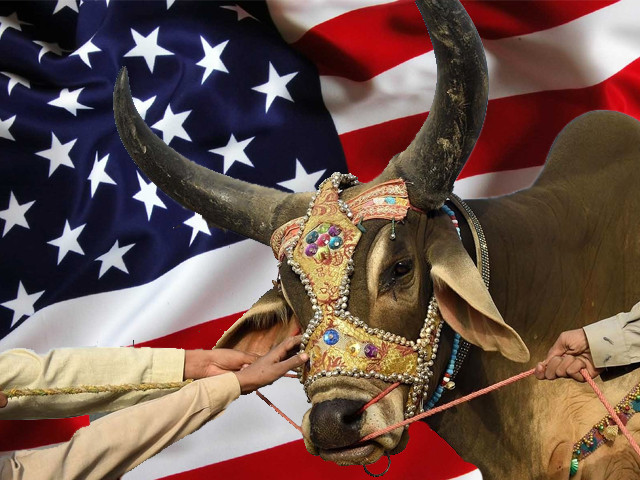I have often been asked by Americans and people from other faiths about the significance of both the Eids, and while Eidul Fitr has been naturally easy to explain, Eidul Azha not so much.
Most of us growing up in liberal Muslim households do not educate ourselves, cerebrally, on the philosophy behind the Islamic rituals and practices we conduct. Every Islamic ritual has a broader and philosophically intellectual significance to it rather than the obvious one, and it is of prime importance to understand the rational aspect of Islam to really and truly understand and appreciate it. Our faith focuses on tolerance, inclusion and peace, and in today’s divisive world, it is of primary importance to focus and teach the next generation the cerebral aspect of Islam, the one that literally means peace.
While having a discussion with young American Muslims, the same question was put forward to me: How would you explain Eidul Azha to a foreigner from your perspective?
I tried to explain to them the best way I know, however, they had some pertinent and intellectual queries that needed a more scholarly take than I had to offer. Hence, I turned to Dr Aslam Abdullah for a more detailed answer to the same. Dr Abdullah is the director of the Islamic Society of Nevada. He teaches Islamic studies at the OLLI centre of the University of Nevada in Las Vegas. He has triple masters in Arabic and Islamic studies, sociology and has a PhD in communications. Dr Abdullah has appeared on Fox News and CNN on various occasions to discuss Islam.
According to Dr Abdullah,
“Eidul Azha, the festival of sacrifice, commemorates sacrifices offered by the family of Prophet brahm (PBUH), the patriarch of the three monotheistic religions, namely Judaism, Christianity and Islam. Judaism and Islam believe varying versions of this great sacrifice. The Jewish faith believes that it was Isaac who was offered for sacrifice, while Islam says that it was Prophet Ismail (PBUH), the eldest son who was offered for sacrifice.
Regardless of the variation in details, the truth is that Prophet Ibrahim (PBUH) and his son were willing to carry out the divine command and sacrifice their dearest possession.”
The following explanation is the intellectual understanding of the great incident, hence an enlightening moment for all those who have been searching upon this topic.
“Obviously, it was a teaching moment for humanity with a clear message that there comes a moment in the life of individuals and nations, when they must be prepared to sacrifice the dearest of their resources for the common good of all. The sacrifice offered by Prophet Ibrahim (PBUH) was a clear statement about the belief in one God, when idol worshipping was the norm. It was a bold move, and one with a very clear message emphasising to people that no individual, power or authority should be followed in place of God. It was a declaration that authority ultimately belongs to God.”
On the explanation and significance of Hajj, Dr Abdullah said the following,
“The visitation to Makkah, for five days, the ritual set in motion by the family of Prophet Ibrahim (PBUH) has few other dimensions. It is an assembly where a community asserts, through its behaviour and many rituals, that it does not discriminate among people on the basis of race, ethnicity, colour, or stature. Everyone is equal in the eyes of God, and it is possible to create a world that has no barriers.”
This, in essence, asserts that barriers are created by human beings.
“The way Muslims dress, live and engage in rituals during that time, enhancing the concept of equality in the best possible manner. Hajj offers the greatest assembly of human beings on earth at one place, and all devoting themselves to the divine guidance. It provides the platform to people from different backgrounds to interact with each other, learn about and from each other and develop a common understanding of goals and aspirations. It cements the bond of commonality and humanity amongst people, who may otherwise differ in language, race or ethnicity. It gives them hope in the principle of equality and unity at a community level, and eventually at the global level.”
This sounds more idealistic than realistic, but religious ideology is focused on common and greater good, its interpretation and practice not so much.
Dr Abdullah further added,
“The other dimension of Hajj is that it gives a sense of historical continuity of the divine message. It reminds us that God has always given guidance to humanity, and that guidance is in our very best interest. In fact, the day of Eidul Azha is not just for Muslims, it is for every member of the Abrahamic family including Jews and Christians. In the recent past, I suggested to Muslim Americans to celebrate this day dedicated to the Children of Prophet Ibrahim (PBUH), and that Muslims should organise programs inviting Jews, Christians and people of other faiths to share their common heritage. I hope that someday, we would be able to do that and live the spirit of Hajj in its real and true spirit.”



COMMENTS
Comments are moderated and generally will be posted if they are on-topic and not abusive.
For more information, please see our Comments FAQ